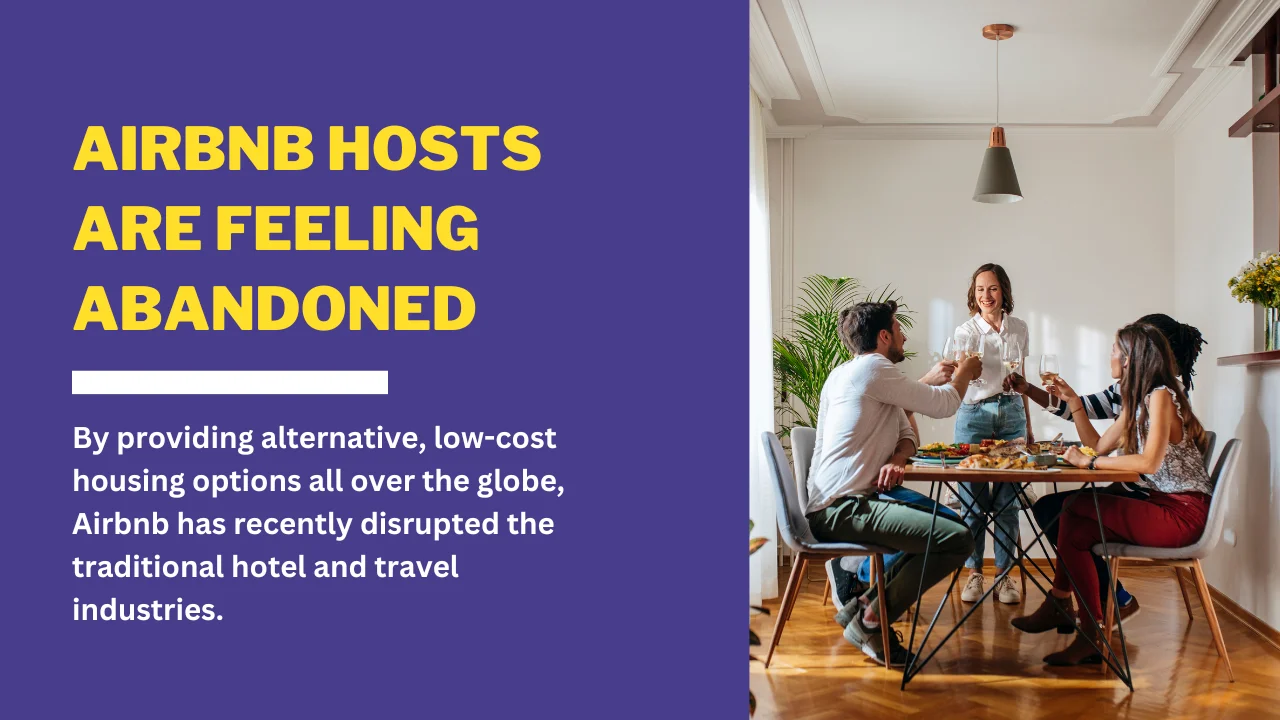Introduction
By providing alternative, low-cost housing options all over the globe, Airbnb has recently disrupted the traditional hotel and travel industries. However, many Airbnb hosts are starting to feel more and more abandoned due to the platform’s evolution. Examining the intricacies of regulatory changes, platform policies, and the changing dynamics between hosts and the company, this article, “Airbnb Hosts Are Feeling Abandoned,” dives into the sentiments and challenges of Airbnb hosts.
Understanding the Hosts’ Plight
With their varied and interesting listings, Airbnb hosts are the driving force behind the platform’s success, drawing in millions of tourists annually. Nevertheless, an increasing number of hosts express dissatisfaction with Airbnb, claiming that the company does not adequately support them and that unfavourable policy changes hinder their capacity to oversee and earn from their listings.
Regulatory Challenges for Hosts
Navigating New Regulations
New, strict regulations are having a major impact on the business models of Airbnb hosts in large cities. Strict regulations have been put in place by city governments to regulate short-term rentals in places like Paris, San Francisco, and New York. These regulations typically mandate that hosts get licences, follow zoning laws, and adhere to occupancy limits. For more information on these regulations, make sure to read articles on the topic by Sam Phillips.
Compliance and Its Costs
Complying with these rules can be difficult and expensive. When it comes to the legal system, many hosts are unprepared. Because of this, a large number of listings have been removed, which has left hosts without income and with the impression that Airbnb does not care about them or offer enough support to ensure they comply.
Impact on Income
These rules will have a huge effect on the economy. Noncompliance could result in heavy fines for hosts, cutting into their income. The financial burden is further increased by the additional costs of meeting regulatory requirements, which include safety upgrades and increased insurance premiums.
Airbnb’s Response
Airbnb has taken a jumbled approach to dealing with these regulatory issues. Many people think the company isn’t doing enough to help hosts and negotiate with local governments. Because Airbnb seems to put its growth and compliance ahead of its hosts’ needs, hosts frequently feel abandoned while they try to resolve these complicated issues.
Idea of Host vs. Guest Prioritization
Dispute Resolution Bias
Among hosts’ most common gripes is the idea that guests take precedence over hosts, particularly when it comes to resolving conflicts. Because Airbnb’s policies frequently favour guests, many hosts feel unfairly punished when guests cancel or have complaints.
Cancellation Policies
For hosts, Airbnb’s stringent cancellation policies are a major pain. Although guests may enjoy refunds or preferential treatment, hosts frequently encounter financial penalties and unfavourable reviews that diminish their listing’s appeal to potential guests.
Support for Hosts
People also have different opinions on how supportive Airbnb is of its hosts. A common complaint from hosts is the difficulty in getting in touch with customer service and getting helpful responses. As a result, the host community feels even more abandoned and frustrated.
Financial Strain on Hosts
Dynamic Pricing Tools
Dynamic pricing tools are just one of many new features and tools that Airbnb has introduced to help hosts maximise their income. There are tools available to help hosts increase their earnings, but larger, more established hosts and professional property managers usually end up benefiting more from them than individual or part-time hosts.
Professional Management Services
Individual hosts now face an even more complex environment as a result of the advent of professional management services. The operational complexity and costs are increased for some by these services, which makes it harder for smaller hosts to compete, even though they benefit some.
Operational Challenges
Bookings, guest communications, and property maintenance are just a few of the operational hurdles that smaller hosts must overcome. New tools and services can increase operational demands and lead to burnout and dissatisfaction due to increased competition.
Strategic Shifts and Host Impact
Co-Hosting Programs
The co-hosting programme is one part of Airbnb’s larger strategy shift towards elevating the platform’s professionalism. Even though the program’s goal is to improve management and guests’ experiences, traditional hosts are worried that they won’t be able to compete with listings that are managed by professionals.
Airbnb-Friendly Apartments
Airbnb has further redirected its focus with the introduction of apartments that are compatible with the platform and are designed for long-term rentals. Because of this change, many hosts are worried about the future of conventional short-term rentals, which was the original goal of Airbnb.
Erosion of Community Values
The original idea behind Airbnb was a community-driven model that highlighted one-of-a-kind, regional activities. Many hosts are concerned that the platform’s recent moves towards professional services and standard offerings are watering down these fundamental principles and isolating them from the company’s purpose.
Also Read: Harry Potter Airbnb Asheville [Brings Magic to the Mountains]
Conclusion
Hosts face significant challenges in the ever-changing Airbnb landscape, and many of them feel abandoned by the platform. As we have discussed, Airbnb hosts are feeling abandoned due to regulatory pressures, a perception of unfair policy enforcement, and strategic moves towards professionalization. To keep its ecosystem healthy and sustainable, Airbnb must address these concerns and improve its support for hosts as it grows and innovates.

David Weber is an experienced writer specializing in business and related fields, delivering insightful and informative content for diverse audiences.





